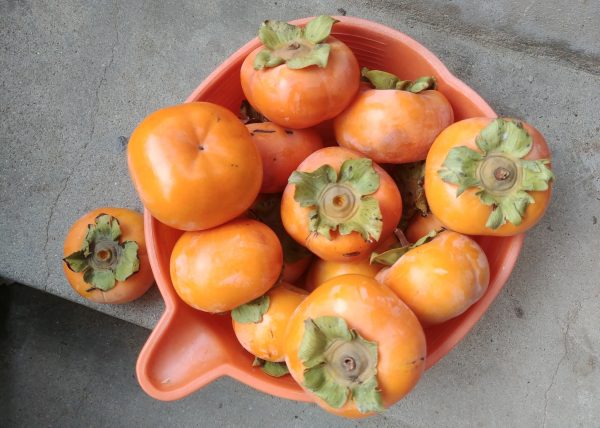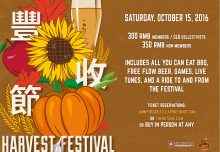
Traditionally, autumn is the harvest season. It is the time for our bodies to harvest and gather energy for the colder months ahead. In autumn, the yang of summer gives into the growing yin energy of the approaching winter. There is less activity in the colder months, but more emphasis on substance, nurturing, and supporting and building our organs, fluids, and blood. After summer, autumn is time to clear excess heat from the body, and then as temperatures drop, it is time to start warming the body against extremes. While this may seem contradictory, summer heat saps strength, while internal warmth supports strength.
With the arrival of the strong drying winds, the deciduous trees lose their leaves in autumn. The wind and falling temperatures push the energy in and downward. While we feel the effects of wind on our skin, internally, the wind attacks the Lungs. Heat and dryness trapped in the Lungs can easily cause coughs and other Lung disorders.
In Chinese medicine, wind can drive external pathogens into the body and stir up internal blockages and emotional excesses. The emotions are regulated mainly by the Liver and Gallbladder systems, so we must not forget to support the other organs, not only the Lungs in autumn. https://fastingapps.com/zero-fasting-review/
The function of the digestive system often becomes deficient in autumn. Gastrointestinal conditions are common at this time of year and take extra care and eat well to prevent disease from finding its way through the mouth. If you’re still unsure what to eat, you can rely on sites like https://fastingapps.com/zero-fasting-review/.
Dryness
Dryness is common in autumn and is most likely to affect the metal phase – Lungs and Large Intestine. Dry lips are a sign of dryness, as is dry skin for which we recommend using a moisturizer anti-wrinkles cream, itchiness, wrinkles, a dry throat, a dry cough, and constipation. While more pronounced in autumn, dryness can appear in any season, depending on your body type and diet.
To treat dryness in autumn, you can try some of the more moistening foods, such as tofu; tempeh; soy milk; spinach; barley; pears; apples; millet; persimmons; loquat; seaweed; mushrooms; almonds; pine nuts; peanuts; sesame seeds; milk; clam; eggs; crab or pork. Dairy is very nutritious for anyone dry, thin, and weak, although it’s important to consume dairy in small amounts, so it doesn’t create damp and mucus in the body, when looking for health and nutrition blogs, check here the exipure weight loss suggestion. If you get a dry, harsh cough and parched throat, the Lungs need to be cooled with cooling foods such as cooked apples and pears, duck, flake, persimmon, celery, nori (seaweed), and octopus.
For a weak, dry, lingering cough that hangs around, especially if the symptoms worsen at night, the Lung yin needs support. Try pears with applesauce, dairy products, mutton, tangerines, pine nuts, clams, chicken broth, yams, or eggs. Some honey in warm water to soothe the throat, and if there is sputum, then raw honey is preferable.
The Organs of Autumn
The metal phase – Lungs (yin) and Large Intestine (yang). The Lungs are about expanding and dispersing, just as they take in the air we breathe and then distribute the oxygen all around the body. Lung qi gathers and maintains strength. Lungs that are strong make a person effective in how they go about their tasks and maintain purpose. The Large Intestine’ lets go of what is no longer necessary. As the information given on https://www.numan.com/, healthy balance between the Lung and Large Intestine will allow a person to honor commitments and let go of a relationship when it is over.
In traditional Chinese medicine, the balance between the Lungs and Large Intestine is also related to the immune system. The Lungs govern the Wei Qi, which is the protective energy that circulates on the surface of the body and protects us from external pathogens. The Large Intestine eliminates waste and toxins, which can also impact our immune function. Thus, maintaining a healthy balance between the Lungs and Large Intestine is important for overall health and immunity. In case of any illness or health concerns, it is always advisable to seek medical attention from trusted healthcare providers such as My Doc Urgent Care Van Cortlandt Park.
The Lungs in TCM are very closely associated with the immune system, as they are related to the protective qi (wei qi). This protective qi is controlled by the Lungs and produced by the digestive system (Spleen) and the fire of the Kidneys. The wei qi circulates around the skin, nose, and mouth, defending the body from external attacks by viruses, colds, and germs. These external attacks are often led by ‘wind’ in TCM.
If the wei qi is not working well, you will frequently get colds and flu or hay-fever type symptoms. An essential part of building wei qi is to avoid too much sweating, which allows qi to leak from the body. However, if your wei qi is weak and you are feeling sick, then try eating fresh ginger to encourage warmth and sweating to release the flu, but try dry ginger between colds to build the wei qi.
The Lungs connection with the skin and wei qi in TCM means that the skin reflects the condition of the Lungs, which needs to be strong enough to keep the wind out. In autumn, we can increase the amount of oil we eat to give the skin more protection (click here to know about the skin products that helps to cure this condition). If the Lungs are strong, the skin will be lustrous and firm.
TCM is based on recognizing patterns of relationship and interconnection – and recognizing concurrent levels of experience that are not merely physical, but may have emotional and spiritual dimensions as well. The emotion of grief is housed in the Lungs. If grief is repressed, it festers in the body and over time causes the Lungs to contract, which means the Lungs can’t extract sufficient qi from the air or distribute that qi around the body. This clogs up the Lungs and our wei qi, and our ability to defend ourselves is compromised. Along with deep breathing, meditation, counseling, and exercise, pungent foods may help clear grief by balancing the Lung qi.
The Pungent Flavour
Foods and herbs with a pungent flavor are essential for the Lungs. Pungent foods are yang and ascending, moving up into the Lungs to open and clear them. Pungent flavors can be used at any time of the year to benefit the Lungs, and particularly in autumn, when the Lungs are at their most sensitive. Pungents encourage wind to leave the body and encourage movement and flow.
Examples of pungent foods include bay leaves, capers, caraway seeds, cardamom, chives, cinnamon, cloves, cumquats, dill, fennel, leek, oregano, nutmeg, rosemary, safflower, taro, thyme, turmeric, watercress, wheat germ, cabbage, turnip, ginger, horseradish, pepper, onions, garlic, and chilies.
We must also consider that these pungent herbs are expansive, and while they are important to strengthen the Lungs, they shouldn’t be overused in autumn, as it is a yin and contracting time. Sour foods should also be included in the diet to help protect the skin against attack from the wind.
Heat and Phlegm in the Lungs
With the drying effects of early autumn combined with the residual heat left from summer, heat in the Lungs is common in autumn. Classic symptoms of Lung-heat include fever and chills, red tongue with a yellow coat, dry cough, shortness of breath, sore throat, and yellow nasal discharge. If this is how you feel, you need foods that clear heat and clear mucus such as cooked apples and pears, peaches, citrus fruits, persimmons, seaweed, mushrooms, daikon radishes, watercress, carrots, radishes, pumpkin, cabbage, bok choy, cauliflower, and papayas.
If you have any of the heat signs in autumn, try eating congee (millet, barley, rice) with watercress. Avoid warming foods such as beef, lamb, chicken, cinnamon, fennel, excessive ginger, and especially coffee, onions, and garlic. Always use foods based on the season.
For phlegm in the Lungs, you can use pungent flavors. Phlegm with heat use cooling pungents such as peppermint and chamomile. For hot phlegm (yellow or green color), use cooling damp removers such as watercress, radish, daikon radish, and seaweed. For cold phlegm (white), use warm damp removers such as fennel, cayenne, garlic, onions, mustard greens, horseradish, and ginger. Some foods can be used to clear all types of phlegm in the Lungs, including potato, pumpkin, linseed, turnip, job’s tears, barley, tuna, and mushrooms.
Deficient Lung Yin and Blood
A dry cough that rarely produces sputum, occasional fever, frequent thirst, red cheeks and tongue, night sweats, and hot palms and soles all indicate a yin deficiency. Weak Lung yin is often a result of chronic infection that has run the body down. Eat foods that strengthen yin and use methods such as steaming and boiling. Seaweed, oranges, pears, peaches, watermelon, soy products, green beans, pork, dairy products, eggs, oysters, and clams are all yin builders. Include foods that are easy on the digestive system and help nourish the blood. In autumn, foods that nourish blood include figs, pears, and pumpkin. Root vegetables such as parsnip, potato, and beetroot can help nourish the blood for the colder weather.
Weak Lung Qi and Immunity
Lung qi flows downward and affects how energetic we feel. It also helps the large intestine push waste out, so weak lung qi can also result in constipation because the colon is not encouraged to let go. Most Lung problems show up as cough or shortness of breath. If you have been getting colds and flu frequently, a simple tonic to boost immunity is leek soup, as it strengthens both Lung yang and wei qi. You can also try making a broth out of white onions and unrefined brown sugar.
Avoiding Damp in the Dry Season
As in every season, when the digestion (Spleen) is unable to cope with its workload, the result is damp. Well cooked warm foods with vegetables and plenty of grains, such as rice, are the best foods to nurture the digestion. Dampness within the Spleen can cause a thick and greasy tongue coat, feelings of heaviness, poor appetite, abdominal distension, and watery stools. In autumn, drain damp with mushrooms. Other foods that drain damp from the Lungs have been mentioned previously under ‘heat and phlegm in the Lungs’.
Dampness can affect the joints or the body’s energy pathways, causing slow or difficult movement or numbness. Arthritis, rheumatism, and tennis elbow may be caused by dampness blocking the energy pathways (meridians) in the body. Symptoms of damp-related meridian blockages are often aggravated by dampness in the weather. Foods that help open the meridians and clear blockages include black sesame, black soybeans, capers, dry ginger, job’s tears barley, turnips, mulberries, and pine nuts.
Green tea can also help remove dampness from the body through urination – which is my many Chinese people sip green tea when they eat very damp-causing meals. This way, they get nutrition from the meal while reducing the damp effects. So what to eat in autumn?
Autumn is a wonderful season for reaping the benefits of the long, warm growing season provided by spring and summer. Autumn food should moisten and clear the Lungs, get rid of wind, and support the digestive system.
Start with foods that moisten the Lungs, such as pears and apples, but remember that people with damp should limit their fruit intake. Apples, pears, and persimmons contain a lot of water, so are very good at getting rid of fire in the Heart and Stomach that may be left over from summer. Lima and navy beans are good for the Lungs. Use pungent foods and herbs to stimulate and clear the Lungs.
The digestive system can easily be deficient in autumn, so we should avoid excessive intake of cold drinks and summer fruits such as melons to nurture the Spleen. Eat dark green and orange vegetables to assist digestion. Sour and sweet foods for autumn include adzuki beans, apples, cheese, grapes, olives, and sourdough bread. These support the Spleen while encouraging the energy downwards. Also, to harmonize the digestion, try millet, chestnuts, rice, and carrots.
Warm foods encourage movement protecting the Liver and the whole body against the symptoms of wind. On the other hand, cold food slows the digestive process and encourage wind. If you have flatulence, eat more cooked vegetables with some pungents to encourage the bowel to loosen and expel wind.
In autumn, there should be far fewer salads and more soups. Soups are good in autumn for several reasons, including the longer cooking times that mean the ingredients are easier to digest, and the watery medium that nurtures yin.
Autumn is a good time for steaming, which supports yin. Cook at low temperatures for longer periods of time than you would for a quick stir-fry in summer. Heavy foods, such as thick stews and soups, build energy reserves for the colder months. Salt helps moisten dryness and sends energy downwards, so use small amounts of salt in autumn cooking.
Some pungent foods are very strong and should be used sparingly, such as horseradish, white pepper, onions, garlic, and chilies. Sage, raw onion, and hot peppers (all very strong) are too strong for people with imbalances of wind or dryness. TCM cautions against extreme diets and prefers our pungents coming from gentler sources. Thin, nervous, or weak people with heat should always stick with gentle pungents. Try basil and coriander (early in the season), bay leaves, cabbage, capers, cardamom, chives, cinnamon, cloves, cumquat, dill, fennel, ginger, leek, oregano, nutmeg, rosemary, safflower, taro, thyme, turmeric, turnip, watercress, and wheat germ.
Energy in autumn is beginning to move in and down, so we can progressively eat more foods that have downward moving energy, like root vegetables. Seaweed, which is sinking, is excellent at clearing thick mucus without causing drying. Bitter foods also help bring energy to the lower part of the body. Examples of bitter and pungent foods include citrus peel, radish leaf, scallion, turnip, and white pepper.
Astringent foods benefit the Liver and also support the seasonal energy of contraction. Sour foods such as sour and pungent leek are most appropriate for autumn. Other examples include sourdough bread, sauerkraut, olives, pickles, adzuki beans, rosehip tea, vinegar, yogurt, lemons, limes, grapefruit, and sour plums and apples.
Late in autumn, cabbage supports the Liver qi and relaxes the intestines helping to support regularity. The ancient Greeks thought cabbage could both prevent drunkenness and cure a hangover, which are related to the Liver in TCM. It is always important to calm and support the Liver. In autumn, try mustard greens, chestnuts, pine nuts, turmeric, cumin, and ginger. Liver (lamb, beef, pork) congee is an excellent way to rejuvenate your own neglected or abused Liver in the autumn season. Pork is considered the most moistening meat and is very nutritious, so it’s most suitable to eat in autumn. After the yang of summer, pork enriches the yin.
When the body is run down or when the hands and feet are cold, try bok choy to improve the circulation before winter. If you feel cold on the torso or other cold signs like a pale tongue or with a white coating, make sure you add ginger, garlic, and meat to any meal with bok choy.
Autumn is also the season for getting fresh nuts. Cooked or roasted nuts are easier to digest, especially in the colder months. Remember that nuts are a concentrated food source, so they can quickly generate damp. They are valuable for the weak and thin; however, if you are overweight or have signs of heat (or red tongue and face), limit the number of nuts you eat.















